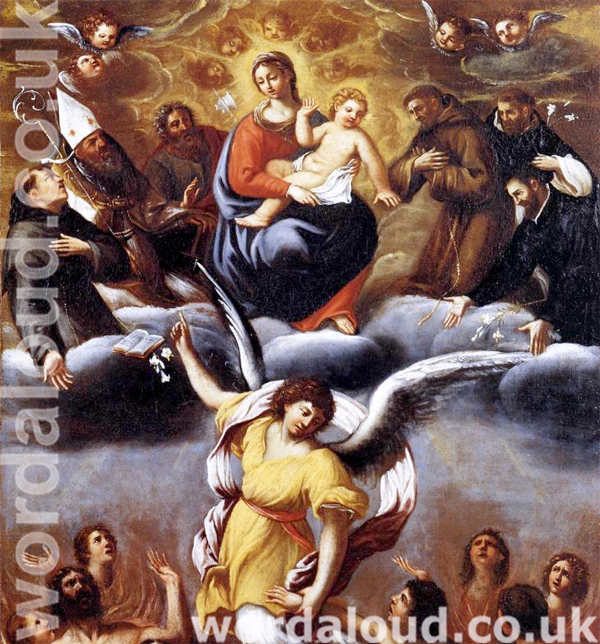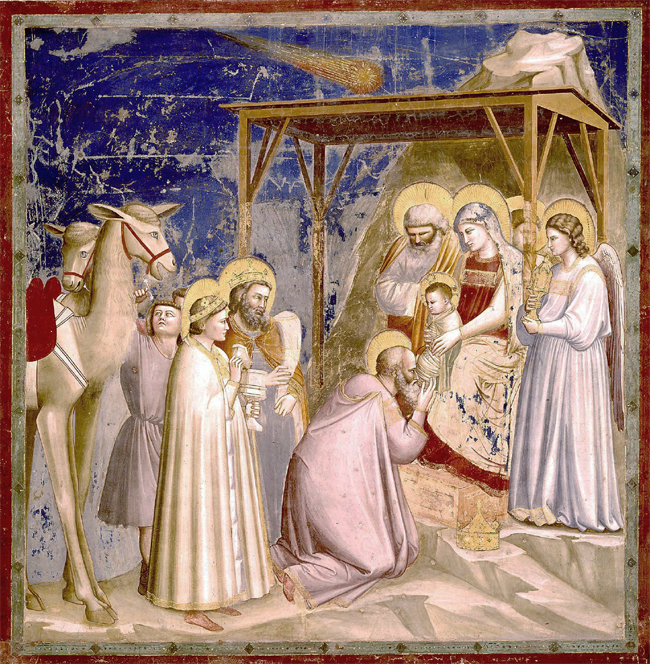Christian Art | Love Revealed By Jesus Christ | Salvation | All Souls | Purgatory
Office Of Readings | Week 32, Sunday, Ordinary Time | A Reading From A Homily Of A Second-Century Author | Jesus Christ Willed To Save Those Who Were About To Perish
‘Christ willed to save those who were perishing.’
This homily conveys the early Church’s wonder at the mystery of salvation. Its tone is both exhortative and contemplative, combining gratitude with a call to deeper awareness of what Christ has done for humanity. The preacher invites his listeners to recognise the full scope of their redemption and to live in proportion to so great a mercy.
The homilist begins by affirming that Jesus Christ is both ‘God and judge of the living and the dead’. Faith, therefore, demands reverence as well as trust. To hold the Saviour ‘in low esteem’ is not merely an error of judgement but a failure to grasp the reality of divine grace. The author insists that knowledge of salvation is inseparable from remembrance of what humanity has been rescued from: ignorance, idolatry, and spiritual death.
He describes the transformation wrought by Christ in vivid imagery of light and blindness. Once humanity ‘worshipped stones and pieces of wood’, seeing only the lifeless products of its own making. Through Christ’s mercy, that blindness is dispelled, and sight is restored. Salvation, then, is presented as illumination — the passage from darkness to vision, from death to life. The early Church often expressed conversion in such terms: Christ as light, believers as those enlightened.
The homily then introduces the prophetic text from Isaiah: ‘Rejoice, O barren woman who never bore a child.’ The barren woman symbolises the Church, once sterile in faith but now fruitful through the gift of Christ. The Church’s ‘children’ are those born through faith and baptism. The metaphor reverses human expectation: the one thought desolate becomes abundant, the once-forsaken becomes the mother of multitudes. This theme of reversal mirrors the gospel’s wider logic of grace, in which divine mercy overcomes human incapacity.
Prayer is described as the Church’s labour, but unlike the travail of childbirth, it is marked by simplicity and perseverance rather than pain. The believer is urged not to grow weary but to ‘offer prayers to God tirelessly and in all simplicity’. This underscores the early Christian conviction that prayer is participation in the Church’s ongoing birth — the bringing forth of new life in Christ.
The final movement of the homily turns from metaphor to direct proclamation of Christ’s saving action. Citing the Lord’s words, ‘I have come not to call the righteous, but sinners to repentance,’ the preacher identifies the heart of redemption: divine initiative toward those who are perishing. Salvation is not the preservation of the righteous but the rescue of the lost. Christ’s glory is to sustain the fallen and to restore what was beyond repair.
This early Christian voice, echoing the tone of apostolic preaching, joins theological reflection with pastoral urgency. Salvation is not abstract but personal and communal, the work of a God who ‘willed to save those who were perishing’. The homily invites believers to continual gratitude, remembrance, and renewal — to live as those who have been called out of darkness and made the living fruit of the barren Church.

A Reading From A Homily Of A Second-Century Author | Jesus Christ Willed To Save Those Who Were About To Perish
Brethren, we ought to regard Jesus Christ as God and judge of the living and the dead. We should not hold our Saviour in low esteem for if we esteem him but little, we may hope to obtain but little from him. Moreover, people who hear these things and think them of small importance commit sin, and we ourselves sin if we do not realize what we have been called from, who has called us, and to what place, and how much suffering Jesus Christ endured on our account.
How then shall we repay him? What fruit can we bear that would be worthy of what he has given us? For how many benefits are we not in his debt! He has enlightened our minds; he has called us sons as a father does; he saved us when we were about to perish. How then shall we praise him, how repay him for his gifts? Spiritually blind, we worshiped stones and pieces of wood, gold and silver and bronze, things made by men, and our whole life was death. Darkness enfolded us, and nothing but gloom met our eyes. Then, by his will, we escaped from the cloud that enveloped us and recovered our sight. For he saw our many errors and the damnation that awaited us, and knowing that apart from him we had no hope of salvation, he pitied us, and in his mercy saved us. He called us when we were not his people and willed us to become his people.
Rejoice, O barren woman who never bore a child; break into shouts of joy, you who never knew a mother’s pangs; for the deserted wife shall have more children that she who has a husband. When he says: Rejoice O barren woman who never bore a child, he is speaking of us, for our Church was barren until children were given her. When he says: Break into shouts of joy, you who never knew a mother’s pangs, he means that we should not grow weary like women in labour, but tirelessly and in all simplicity offer our prayers to God. He declares that the deserted wife shall have more children than she who has a husband, because faith has now made our people who seemed to have been deserted by god more numerous than those who were thought to possess him.
Another text says: I have come not to call the righteous, but sinners to repentance, for it is those who are perishing who must be saved. It is a great and wonderful work to uphold those who are falling, rather than those who already stand firm. Christ willed to save people who were in danger of losing their souls, and he has been the salvation of many. When we were on the point of perishing, he came and called us.
Christian Prayer With Jesus Christ
Lord Jesus Christ,
you came not to call the righteous but sinners,
not to preserve the strong but to raise the fallen.
You saw us in darkness and gave us light;
you found us perishing and gave us life.
Grant that we may remember what we have received,
and live in constant thanksgiving for your mercy.
Make your Church fruitful in faith and steadfast in prayer,
that she may bring forth new life for the world.
To you, our Saviour and our God,
be praise and glory forever.
Amen.
Glossary Of Christian Terms
Salvation: Deliverance from sin and death, the restoration of humanity to communion with God through Christ.
Idolatry: Worship of created things in place of the Creator; in this text, the spiritual blindness from which Christ rescues humanity.
Illumination: A traditional early Christian term for enlightenment through faith and baptism; the movement from ignorance to divine understanding.
Barren Woman: A prophetic image from Isaiah representing the Church, once unfruitful but made fruitful by God’s grace.
Faith (as Fruitfulness): The interior transformation that produces spiritual life, expressed through prayer, worship, and moral renewal.
Repentance: The turning of the heart and mind away from sin toward God; the essential human response to divine mercy.
The Righteous and the Sinners: A contrast used to reveal that Christ’s mission is directed primarily to those in need of redemption, not to those who presume on their own virtue.
Divine Initiative: The action of God in seeking and saving humanity before any human effort; the foundation of grace.
Light and Darkness: Symbolic of knowledge and ignorance, grace and sin; conversion is portrayed as movement from one to the other.
The Church as Mother: A central image of early Christian thought, expressing how the community of faith nurtures new believers through the Spirit and the sacraments.








